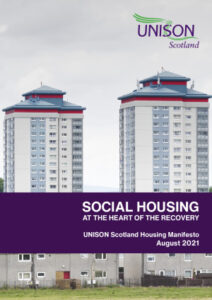 During the pandemic we discovered that it is – in fact – possible for politicians to take radical action very quickly.
During the pandemic we discovered that it is – in fact – possible for politicians to take radical action very quickly.
The same urgent political commitment is needed to end homelessness and rough sleeping permanently by building enough social homes of the right type and in the places that are needed.
We have learnt the added value of social housing during a crisis: how it builds community resilience and protects the most vulnerable.
During the pandemic, UNISON members in housing associations and councils played an outstanding role in feeding and caring for tenants in need. A similar response from private landlords is unimaginable; they are neither equipped nor motivated to do so. Investment in social housing must now be at the centre of the post-pandemic recovery.
For 40 years governments have driven an agenda where homes are for profit. As a result, unearned housing wealth has become one of the main drivers of the widening gap between rich and poor.
Promoting the idea that social housing is a ‘safety net’ which only exists to help the poor and vulnerable is part of this agenda. It has been spun by governments since the 1980s, leading to the unjust stigmatisation of council housing in particular – and social housing generally – as well as those who live in it.
